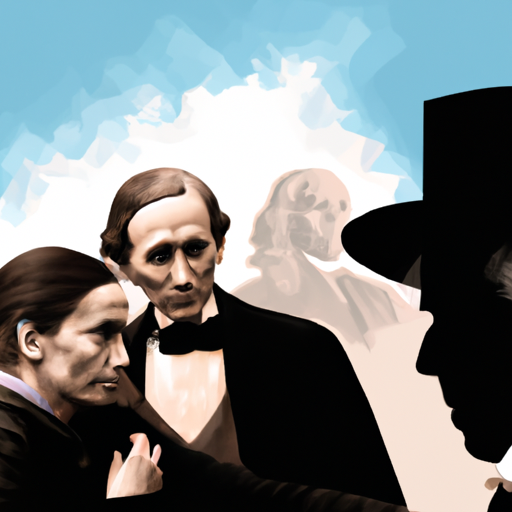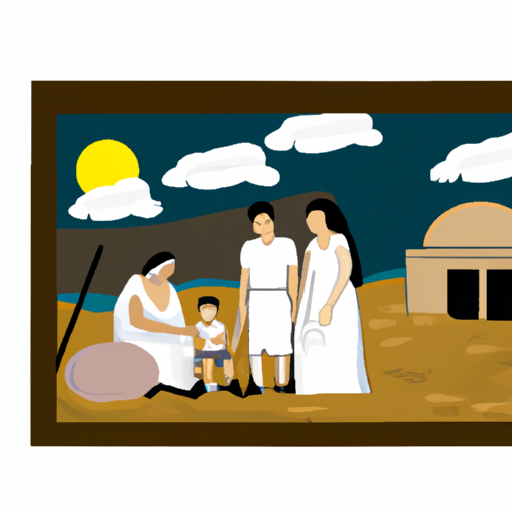A History of the World’s Oldest Religions
Delve into the past to uncover which religion has the deepest and most far-reaching history. Unearth the mysteries of faith by traversing through time and space. Discover which belief system has endured the test of time. Trace the origin of these spiritual traditions to gain insight into their longevity. Uncover the secrets of antiquity to learn which religion is rooted in antiquity.

Venturing into the past of religious traditions can be a captivating journey. By tracing the source and development of spiritual customs throughout time, it is possible to gain an understanding of which faith has withstood the test of time. From early Mesopotamian religions to modern-day beliefs, there is a plethora of information to uncover about the past.
One of the oldest known religious systems is Hinduism, which dates back to at least 1500 BCE in India. It is based on Vedic scriptures that contain many hymns, rituals and philosophical teachings that form its core beliefs. This religion also includes numerous deities such as Brahma, Vishnu and Shiva who are seen as manifestations of one divine being.
Judaism is another ancient faith with a long and rich history. The earliest evidence for this religion dates back to around 1300 BCE in what is now Israel. Judaism follows monotheism – belief in one God – and abides by laws from the Torah (the Jewish bible). Furthermore, ethics and social justice are central components of this faith.
Christianity is a major world religion whose roots reach back to 30 CE in Jerusalem. It was founded by Jesus Christ who taught his followers to love their neighbors as themselves and follow his example of selfless service. Christianity focuses on Jesus’ death and resurrection as well as his teachings found throughout the New Testament (the Christian bible).
Islam is another major world religion that originated around 610 CE in Mecca, Saudi Arabia when Muhammad received revelations from God through Gabriel (as described in the Quran). This faith shares many similar principles with Christianity but puts strong emphasis on submission to Allah’s will and following Islamic law (Sharia).
By exploring these religions’ histories we can gain valuable insight into which belief system has been sustained over centuries and millennia. Each faith provides unique perspectives on spirituality that have shaped our world today.
.
Introduction

A mysterious past, filled with a myriad of complexities, lies behind the subject of religion. It is near impossible to ascertain which faith is the oldest, as there have been many different ideologies that have been around for an extended period of time. Amongst these are Hinduism, Judaism, Zoroastrianism, Jainism and Buddhism – all having endured for thousands of years and having left their mark on the evolution of other beliefs. Even in present times, these religions are still being followed by millions across the world.
– History of the Oldest Religions
The mysteriousness of the oldest religions on earth is captivating. Spanning thousands of years, various belief systems and traditions have been passed down throughout time. From the Egyptians to Hinduism, these ancient faiths have had a great impact on our culture and comprehension of the world around us.
Ancient Egypt was the first known religion. It is said that their gods controlled all aspects of life from fertility to death, as well as natural phenomena like floods and storms. Temples were built to worship these gods and elaborate tombs for deceased individuals were constructed. This religion has had far-reaching influences in Africa, Europe, and Asia.
Hinduism is another ancient faith which originated in India and is widely practiced today. It involves multiple gods who are responsible for different facets of life such as creation, destruction, protection, knowledge, wisdom, and justice. Additionally, Hindus believe that every individual has a soul which can be reincarnated depending on how they lived while alive.
Judaism also has its roots in antiquity with its teachings dating back thousands of years ago. Jews believe that there is only one God who created everything in existence and revealed himself through prophets such as Moses and Abraham. The Torah or Old Testament Bible scriptures outline God’s laws which humans must live by according to this faith system.
These three religions are just a few examples among many others which have been practiced since antiquity and have left an indelible mark on our understanding of life, culture, spirituality, morality, ethics, law, politics, art and literature over centuries or even millennia!
– Ancient Origins of World Religions
Throughout the ages, religious beliefs have been shaped by various influences, from geography to politics and culture. From ancestor worship to animism, ritual sacrifice to cosmology and mythology, ancient religions have left a lasting mark on our modern-day faiths. While each religion has its own unique history and set of beliefs, many of them share common elements that can be traced back to their ancient origins.
Ancestor worship was one of the earliest known religious practices. This form of reverence involved honoring deceased family members or ancestors as gods or goddesses in order to gain protection or favor from them in life. This practice was widespread in many parts of the world during antiquity and continues to be practiced today in some form or another.
Animism is another element found in many ancient religions. This belief holds that all living things possess a spirit or soul that can interact with humans. Animistic beliefs were held by numerous cultures around the world and continue to be an important part of some modern-day faiths such as indigenous religions in South America and Africa.
Ritual sacrifice was also a common feature of many ancient religions. Rituals were often performed in order to please gods or goddesses or gain favor with them. This practice was widespread across Europe, Asia, Africa, and the Americas and still exists today within some modern-day faiths such as Hinduism and Santeria.
Cosmology and mythology were also important aspects of many ancient religions. Cosmology refers to theories about how the universe works while mythology explains why certain events happen as they do according to stories passed down through generations. Many cultures developed elaborate creation myths which served as explanations for natural phenomena such as thunderstorms or eclipses while others used mythology to explain why certain social customs existed such as marriage ceremonies or burial rites.
The influence of these ancient religious practices can still be seen today in our own faith systems around the world; by exploring their history we can gain insight into our own beliefs and better understand how our own faith systems evolved over time from their distant roots.
– Historical Significance of Early Religious Practices
Since the dawn of civilization, religious practices have been a fundamental part of human experience. From ancient Egypt to Mesopotamia, religion was integral in shaping societies and cultures around the world. Offering sacrifices to gods and goddesses was believed to bring favor and protection, while providing a sense of unity among people. In India, Vedic literature served as a guide for spiritual growth through meditation and contemplation on sacred texts. Buddhism emerged from this tradition, emphasizing compassion and non-violence as essential values for living an ethical life. Judaism is based on teachings found in the Torah which emphasize faithfulness to God’s commands.
These early religious practices provided an invaluable framework for understanding our place in this world while connecting us with our spiritual selves. Through ritualistic acts like prayer, sacrifice, meditation and contemplation we can gain insight into our purpose while finding strength in our shared beliefs with others across time and space.
– Evolution of Religious Beliefs Through Time
For millennia, humanity has been enraptured by the spiritual realm. From the earliest of civilizations, we can trace a captivating journey of religious evolution. By examining our own spiritual progression and how different cultures have shifted and adapted throughout history, we can attain insight into this mesmerizing phenomenon.
Animism is believed to be the oldest form of religion, stemming from Paleolithic times. This spiritual system is based on the notion that all living things possess a soul or spirit, thus creating a bond between them. Animism was regularly expressed through rituals, offerings, and veneration of ancestors.
As humans began to inhabit agricultural societies, they created more intricate religions built around gods and goddesses connected to nature and fertility. These deities were thought to control natural forces such as rain or storms, making them immensely powerful in ancient settlements.
In 2000 BCE in the Middle East, monotheistic faiths like Judaism and Christianity emerged with their focus on one God as creator of everything in existence. This revolutionary concept brought forth principles such as faithfulness, righteousness and salvation which were incorporated into worship practices.
Around the same time period in India Hinduism began to develop its own distinct set of beliefs including reincarnation, karma and enlightenment. Buddhism was born from Hinduism during the 6th century BCE and swiftly spread throughout Asia with an emphasis on inner peace achieved through meditation.
Islam appeared in the 7th century CE with teachings about one God (Allah) who sent revelations through his prophet Muhammad (peace be upon him). Islam rapidly grew across the Middle East and Africa due to its commitment to social justice and equality among believers regardless of gender or ethnicity.
The history of religious beliefs reveals our spiritual growth from primitive animism to sophisticated monotheistic faiths like Christianity and Islam; reminding us that these religions may vary in certain aspects but share a common goal – bringing people closer to their Creator through faith alone.
– Investigating the Prehistoric Roots of Religious Traditions
Exploring the primordial beginnings of spiritual custom is an absorbing expedition into humanity’s religious heritage. By analyzing archaeological artifacts, we can trace the source and evolution of religious convictions and rituals over time. Primitive forms of worship such as animism, veneration of ancestors, and shamanism have been detected in ancient cultures around the globe. These spiritual systems provided individuals with a way to interpret natural phenomena and comprehend their lives in an unpredictable environment.
The oldest known proof of religious activity dates back to Paleolithic hunter-gatherer communities from 30,000 to 10,000 years ago. Archaeological sites show that these early people had faith in some kind of supernatural power or forces that could be accessed through ceremonies or offerings. They also crafted art depicting spiritual figures and symbols, implying a conviction in an ethereal world beyond their own comprehension.
As societies advanced progressively, so did their religious beliefs and customs. Ancient Mesopotamian civilizations developed polytheistic religions based on gods related to natural elements like wind or water. The Egyptians constructed immense monuments to honor their gods while the Greeks concocted complex legends about them. In India, Hinduism emerged as a complicated system that focused on personal enlightenment through meditation and spiritual growth. Buddhism spread throughout Asia with its essential teachings on suffering and liberation from worldly desires.
Present-day major religions are based on these archaic spiritual traditions but have evolved over time to satisfy changing social needs. As we persistently investigate our primitive past, we gain insight into how our predecessors viewed the world around them—and how they used religion to make sense of it all.
conclusion

It is a perplexing query, with no definitive answer, as to which religious tradition has the longest-standing history. Numerous ancient faiths have been practiced for centuries, such as Hinduism, Judaism, and Zoroastrianism; each of these religions having their own distinct origin and convictions.
.
Some questions with answers
Q1: Which religion is oldest?
A1: The oldest known religion is Hinduism, which dates back to around 1500 BCE.
Q2: What is the history of Hinduism?
A2: Hinduism began as a polytheistic religion in India around 1500 BCE. It has evolved over time and continues to be practiced by millions of people today.
Q3: How did Hinduism spread?
A3: Hinduism spread throughout South Asia and Southeast Asia through trade and conquest. It also spread to other parts of the world, such as Europe and North America, through immigration.
Q4: What are some core beliefs of Hinduism?
A4: Some core beliefs of Hinduism include the belief in karma (the consequences of one’s actions), reincarnation (the cycle of rebirth), and dharma (moral law).
Q5: How does Hinduism differ from other religions?
A5: Hinduism differs from other religions in its lack of a single founder or prophet, its diverse set of beliefs, its emphasis on karma and reincarnation, and its acceptance of different paths to spiritual enlightenment.




